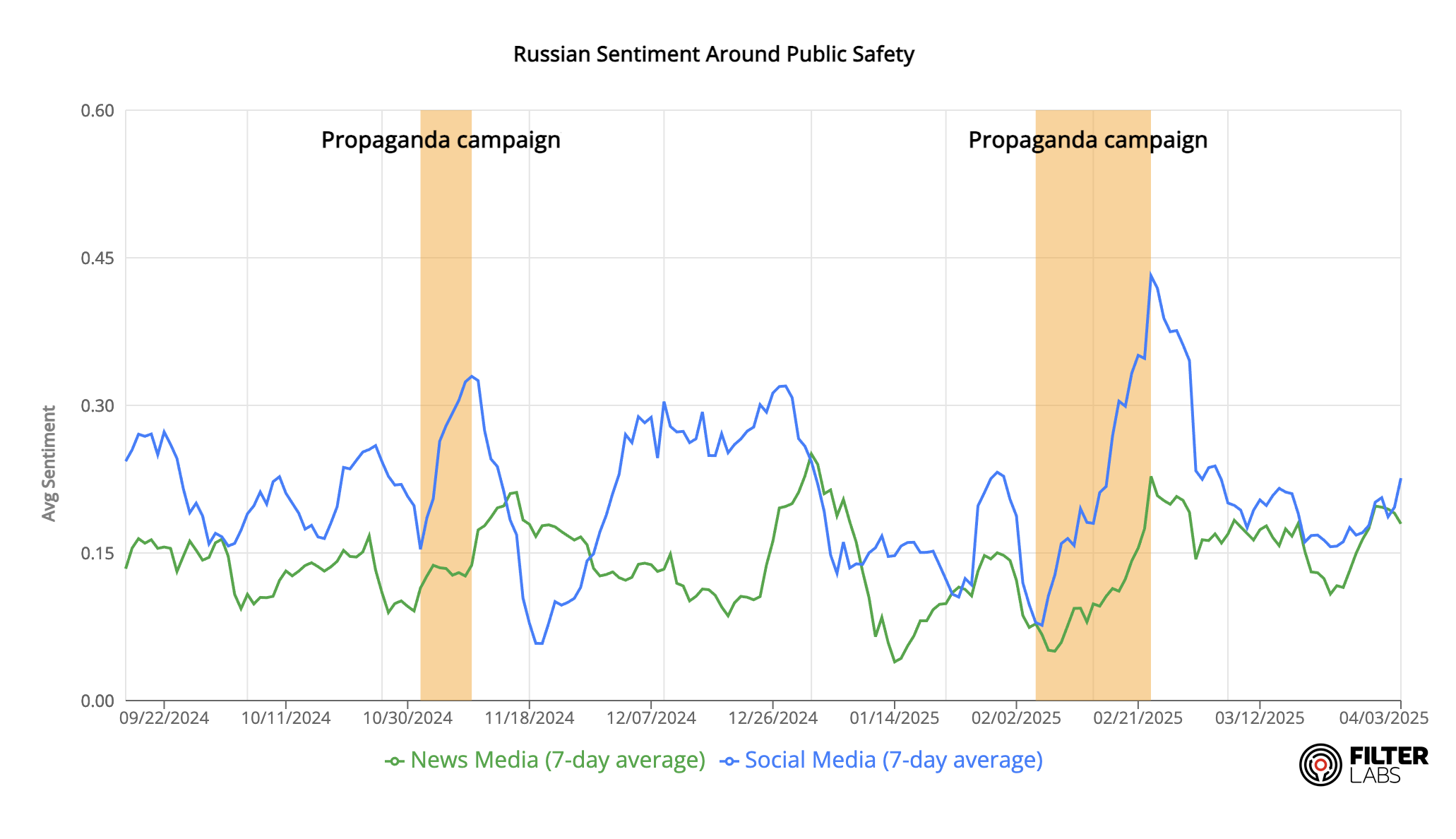Uncovering a Putin Propaganda Campaign
As their government wages war on Ukraine, many Russians are feeling like public services—especially those dealing with their public safety—are being neglected. They complain about unsafe public transit, man-made fires, online scammers, and even stray dog attacks.
The Russian government is aware of these apprehensions and appears to be launching propaganda campaigns to divert blame away from the state. FilterLabs uncovered these campaigns using Talisman, our data analytics dashboard, when we looked into discrepancies between official and netizen narratives on public safety.
First, a little more on the concerns of everyday Russians. Our analysis of social media discourse suggests their concerns about safety go beyond stray dogs and unsafe buses. They are also lamenting:
- Poor road quality. Russian netizens cited decaying infrastructure as a real hazard. One Telegram post from Biryukovka pointed to poor road repairs while Russians across the country complain about potholes, unevenness, flying debris, and broken sections.
- Drunk driving & car accidents. The roads are unsafe for other reasons, too. On social media platforms VK and OK, there were many announcements about funerals for, or reposts of articles about, car accident victims, such as a 17-year-old resident of a village in Tyumen.
- Pollution. In an OK post about burning garbage in Novopavlovsk, someone asked: “What’s the city administration doing? How many times can this keep happening? It’s unbearable to breathe. Why do the kids have to breathe in this stuff?”
Then there’s the government line. Over the same period, FilterLabs found that discussions of safety in Russian news focused on a few major counter-narratives:
- Ukrainian drone strikes: “Voronezh oblast was under threat from UAVs for more than 6 hours!” read a typical headline. Another blared: “AFU drone attacks civilian car in Kursk oblast, man killed.”
- Terrorism: In one illustrative example, Belgorod’s governor attempted to reassure families that there was no risk of terrorist attacks in local schools after reported threats. He blamed the rumors on foreign information ops: “We see that the information comes from outside our country. There is an aggressive information attack on our children and parents. Law enforcement agencies are aware of what happened. [...] The situation is under maximum control.” Other discussions focused on the “growing terrorist threat” posed by Ukraine.
- Migrants. Police raids on undocumented migrants make frequent appearances in news media as scapegoats, as when 55 people were detained in Tver oblast and 90 were detained in Ryazan oblast.
The Kremlin propaganda machine also seems to be making active use of social platforms. A suspicious number of social media posts appeared online in November 2024 and February 2025, often in waves of identical content, typical of coordinated messaging campaigns. Sentiment correspondingly shot up. Some of these posts reinforced the same fear-based narratives as the news coverage. Many others lauded recent infrastructure improvements designed to improve safety. These narratives were widely disseminated by government-affiliated accounts but had low engagement; they either had no comments, or had comments disabled, another sign of artificiality.
It is worth noting that there does not seem to be evidence of Russian netizens blaming Putin’s government for the public safety issues. And they are not yet connecting their frustration to the government’s prioritization of Ukraine or other Moscow misadventures.
But the mere fact that the Kremlin feels the need to launch propaganda campaigns in this space shows they are paying attention… and probably worried.
Explore the Data in Talisman
Have questions of your own? Want more hyper-local insights into hard-to-reach places (like Russia and Syria) around the world? Check out the live data on our platform, Talisman! Subscribers with full platform access can investigate the chart above and the individual artifacts underlying it. You can also view the charts for other recent stories—including new data in the dashboard for last week's analysis of sentiment around the government and HTS in Syria.
If you don’t have a Talisman account yet, sign up now– a basic subscription is free!
%20-%20Tradmark.png)
